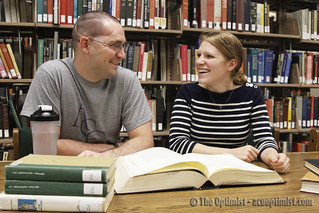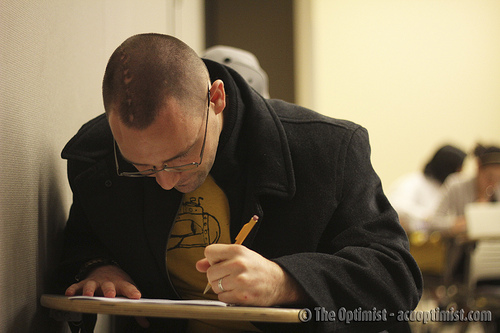Justin Gibson is not your average student.
The 27-year-old junior social work major from Gatesville first began his college career at ACU two years after graduating high school.
Because of poor academic performance and for not meeting the Chapel requirements for two consecutive semesters, Justin was kicked out of ACU.
But last semester, Gibson got his second-chance. And that is only the half of his story.
Gibson and his girlfriend, Melissa Mason, don’t stand out in a scholar-stuffed library in the middle of mid-terms week. Both have limited time to talk, Mason reminds Gibson of his and her schedule. Gibson kisses her forehead in response.
The couple met three years ago, set up by family members on a date. But casual dating turned critical shortly after they celebrated their first anniversary.
“One year and one week exactly,” Gibson said, “that’s how long we had been dating.”
And then everything changed.
On March 30, 2012, Justin was headed to his weekly volunteering with a YMCA kid’s program, riding his Honda scooter.
According to the police report, after another ACU student turned left against an unprotected green light, the Dodge Neon car hit Gibson head-on, throwing him from his scooter and landing him in the intersection.
Gibson was first rushed to Hendrick Medical Center before an overbooked ICU had him flown to Parkland Hospital in Dallas.
Doctors performed brain surgery right away, but his severe head injuries led to extreme swelling and sent Gibson into a coma.
Two days into his coma, Mason made the decision to drop out of school.
“People and my professors were very supportive of my decision,” she said. “They understood that Justin’s health came first and school could always come later.”
Doctors first estimated Gibson would remain in a coma for three months up to two years.
“I wasn’t going to leave his side until he came to and he was able to function,” she said. “There was no way I could be expected to be in school with him in a coma.”
What doctor’s didn’t expect was for Gibson to wake up 12 days later.
“He kissed me,” Mason said. “That’s how we knew he was out of the coma.”
Torn ACL.
Fluid in his lung.
Double vision in one eye.
Partially paralyzed vocal chord.
Deafness in one ear.
But despite the severity of his injuries, his humor wasn’t spoiled.
“Scooter versus car – not a very good battle,” he joked. “Terrible idea.”
“But what did you learn how to do that day?” Mason asked him.
“I tried to fly, but I failed apparently,” he said. “I mean, from what I’m told.”
Gibson clocked in a month-and-a-half hospital stay as Mason reported his ever-changing condition in a 62-entry online journal.
When released, Gibson and Mason originally planned to stay in Dallas for outpatient therapy. But after plans fell through, the couple returned to Abilene.
During the summer of 2012, Gibson began the long, intense road to recovery, undergoing speech, physical and occupational therapy.
Though doctors’ original prediction still placed Gibson in a coma, he had other plans.
“When we came back and started rehab here I really wanted to finish my degree so I could do something more than work at the fast-food restaurants that I have worked at,” he said. “I’ve always wanted more.”
Gibson began auditing two classes in the fall of 2012, testing the new, but familiar grounds at ACU.

Gibson and Mason had been dating only a year before his accident drastically changed their relationship. (Optimist photo by Mandy Lambright)
“I did very well,” he said. “So I went back in the spring as a full-time student.”
Though enrolling back at ACU was a huge triumph, recovery is ongoing.
He still suffers from aphasia, which makes it difficult for him to find a word, or he will use the wrong word in place of it, Mason said.
“And memory loss,” she continued. “Lots of memory loss.”
“Tons of it,” he interrupted. “Some days I can dig more information than others, but it’s really the past three to five years that are just kind of lost.”
No climbing. No swimming. No going anywhere near water. No driving.
“He’s very limited,” Mason said. “Because he has epilepsy now. He can’t drive.”
Texas law requires an individual be seizure-free for three months before an individual can be licensed to drive.
“We are at four days seizure-free,” she said. “We were at three months until Saturday.”
But this has become the new normal for them, so they laugh at the post-accident adjustments they have had to make.
Melissa registered for 12 hours in fall 2012, only taking on Tuesday-Thursday classes so she could drive Gibson to his many doctors’ appointments in Dallas.
“I’m his chauffer,” she declared. They both laughed.
“I should get a hat for that: ‘Justin’s chauffer,'” she said.
“I have a lot more responsibility now than I have ever had before,” she said. “In some ways, Justin’s life is in my hands. It’s my responsibility to take care of him if he has a seizure.”
But Mason has taken up the role as his advocate as well.
“People don’t realize the effects that epilepsy can have on him. I spend a lot of my time researching his medical conditions in order so that I can be knowledgeable. I fight for him, and I’m only able to do that since I know what the doctors are talking about.”
Justin’s condition has inspired Mason toward the hopes of getting her master’s in psycholgy and a Ph.D. to become a researcher.
“I really want to research traumatic brain injuries, post-traumatic epilepsy and neuroplasticity,” she said.
For Gibson, being a student looks radically different than it would to your average junior.
“College life is different for me because everything is centered around the accident,” he said. “Now I do certain things and avoid certain things because of the accident.”
“Whereas most students would normally study for a test for four hours, Justin has to for eight,” Mason said.
Mason meets with his professors before the semester begins to brief them on his condition and the steps they must take if he were to have a seizure in class.
“Dan Brennan is one professor who I have become close with,” Gibson said. “I remember when I was taking his class, I had three Grand Mal Seizures the night before class and that day he came over to my house and brought some soup that he had made.”
It is this sort of ACU support that has made his recovery possible, they said.
“ACU was so supportive during the accident, and they still are now,” Mason said. “Teachers came out to see Justin in the hospital in Dallas. I received tons of emails and phone calls of support and prayer. If I didn’t have the support of my school, I would not be able to get through my semesters.”
Gibson agreed.
“It is extremely heartening knowing that a large group of people have my back through the challenges that I went through and still go through today,” he said.
Gibson is set to graduate May 2015, without the fear of not meeting Chapel-credit requirements.
“I am old enough that I no longer am required to go,” he said. “I usually go to chapel twice a week, but rarely swipe in for it.”
Before the accident, Gibson planned on being a police officer, but said he wasn’t sure realistic that dream is now.
“So for that I am just waiting to see what becomes available,” he said.
This theme of change has carried into their faith.
“It brought me closer to the Lord,” Mason said. “I recently realized why I didn’t pray too often when Justin was in a coma. I think I avoided prayer because I didn’t want to blame God if Justin didn’t make it. I feel blessed that the Lord has given me more time with my awesome man. I count my blessings everyday. He’s a miracle.”
“My faith has given me a reason to recover and to try my hardest to finish school,” Gibson said. “If it was not for my faith, I would have given up a long time ago.”
The couple was planning to be engaged last summer, but because of the accident, Gibson’s medical bills total to almost $1 million.
“This makes it pretty difficult for us to get married right now,” she said. “My parents don’t want me inheriting his debt, so we are waiting until the debt has dissipated and, hopefully, by that time Justin will be able to work full time to help support us as a family.”
But even in a relationship that calls for Mason to act as a caregiver, Justin compensates with equal service, she said.
“Almost every time he wakes up after having a seizure he says something like ‘You’ve served me too much today, it’s my turn to serve you,” or “Baby, you relax, I’ll cook dinner,'” she said. “The funny thing is, it’s in those moments he’s unable to move at all and he really couldn’t serve me, but he always has that desire. I got blessed with a really great guy.”

